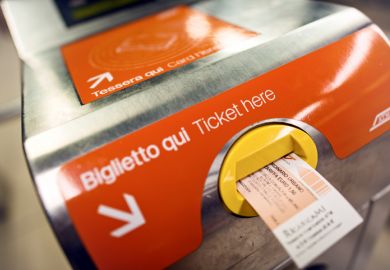The National Audit Office began an investigation into the provision of disability assessments at Plymouth University after concerns were raised about the “higher than expected” proportion of students receiving learning support.
In its report published on 13 March, it found students assessed at Plymouth received an average of £4,759 in Disabled Students Allowance in 2012-13 – more than double the national average of £2,227 and the highest rate in the country by some distance.
Some 9.3 per cent of students received DSA in that year compared to the national average of 5.8 per cent, it also found.
The company which undertakes the majority of assessments at Plymouth - Access South West - is also the same company as Claro Learning, which “automatically” provides non-medical help to most Plymouth students requiring support thanks to a verbal agreement it had with the university, the NAO says.
The NAO criticises the failure to respond to the potential conflict of interest as the Tavistock-based company was both assessing student need and carrying out the services for them, which meant the majority of Plymouth students assessed by the Access South West centre “are automatically supported by Claro Learning”.
Margaret Hodge, chair of the Public Accounts Committee, which raised concerns about the Plymouth situation in 2013, said the case showed the Department for Business, Innovation and Skills needed to “get a much better grip on its oversight of DSA if it is to make sure that the public purse is not put at risk”.
The report has come after controversial cuts to DSA – worth £128 million in 2012-13 – were postponed until 2016-17. Student and disability groups have condemned the reforms which follow concerns that the grants to pay for laptops and software are distributed too freely.
In its report, the NAO found the Access South West approach to assessments up until July 2013 – in which it recommended the “maximum level of support a student might conceivably need”, rather than the “most likely level of support the student required” – was allowed under BIS guidelines, but “not in line with the spirit of BIS’s guidelines” and “out of step” with other assessors.
Claro, a provider of specialist services for adults with disabilities, such as learning support, mentoring, note taking and assistive technology training, supported 2,066 students and received payments worth £7.3 million in 2012-13, the NAO found.
The NAO criticises the “weak oversight” of assessment practices at Plymouth by BIS, which allowed Claro to receive higher-than-average commissions for many years.
BIS had also failed to take sufficient action to mitigate the conflict of interest of having one company undertake disability assessments and then provide the support services themselves.
Ms Hodge said it “feels just wrong” that Access South West and Claro were the same company given their respective roles.
“The Department for Business, Innovation and Skills did not spot soon enough the conflict of interest between Access South West and Claro, where the assessor of students’ support requirements at Access South West was married to the director of Claro,” she said.
“Furthermore, the chief executive of Claro was the line manager of the regional manager of Access South West,” she added.
BIS had “missed a red flag” by not noticing that the average payment for students assessed was the highest in the country and double the national average, she added.
The report, however, notes that Access South West had declared its relationship to Claro to BIS and had said it would provide at least two quotes to students to mitigate the risk of a conflict of interest.
A Plymouth spokesman said the matter “concerns the relationship between two organisations that are separate entities and independent from Plymouth University”. “One of which assesses the needs of disabled students, and one which acts as a support provider,” it added.
The independent assessment provider was contracted by the university following a full tender process, it added.
“As acknowledged in the report, the university therefore plays no role in the process by which funds are allocated and its arrangements are fully approved by the DSA and BIS.”
In a statement Claro Learning said the higher level of support to students with disabilities was a “result of our policy of rapid engagement of students” .
“We have no waiting list, we offer flexible delivery of services when and where students require it, we monitor support closely and work in partnership with higher education institutions to identify students with support needs early on”, which explained why students take up a higher proportion of their support, it said.
It had operated within all official guidelines and the report concluded that “the review has not identified any conflicts of interest as contained within the allegations made to NAO that would impact on the way in which Claro Learning operates as a provider of assessments and as a provider of the support”, it added.
“Our data shows that the level of support taken up by students is irrespective of whether they are assessed at Access South West or any other assessment centre,” it added. However, it will undertake an internal review following the report’s publication, it added.
A BIS spokesman said: “We treat the issues identified in this report extremely seriously and are already taking action to address them, including strengthening oversight of the Disabled Students Allowance to better monitor payments.”
“Our priority remains to ensure students get the support they need while providing the taxpayer value for money,” he added.




